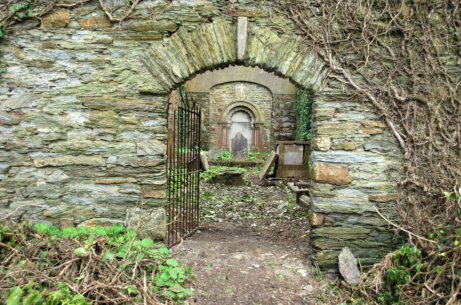
Gates Cambridge Scholar Richard Butler has been team leader on a project to restore an 18th century Irish church.
An 18th century Irish church which became a walled graveyard has been restored by a team led by a Gates Cambridge Scholar.
Richard Butler [2012], who is doing a PhD in the history of art, was project supervisor for the restoration of Garryvurcha Church and graveyard in the small town of Bantry in County Cork which opened to the public this week.
Until recently the church was completely overgrown and inaccessible to the public.
Restoration work took a year and involved trimming back overhanging ivy, putting broken tombs back together, making headstones and graves visible and clearing the entire site and constructing a path so people can walk around it.
Richard said: “The church may have been built as early as the 1720s, but was certainly built by 1749, when it is mentioned in a traveller’s report.”
It was abandoned around 1820 when another church was built in the town. The inside of the church then became part of the graveyard with burials continuing to the mid-1980s.
It is believed that the site was also used as a Roman Catholic burial ground, and it is likely many Catholics were buried there during the Irish famine.
Many people gave donations in support of the restoration, in particular the American-Ireland Fund.
Richard, who grew up in Bantry, has been very involved in conservation and heritage in Ireland, and worked with the Irish Government, local state bodies, and interested parties to have some remaining fragments of Ireland’s nineteenth-century industrial architecture listed and protected.
For his PhD he plans to write a history of Irish public architecture from the Act of Union (1801) to the late 1860s, taking in the effects and repercussions of the Great Famine, and focusing in particular on how the built environment was created in a colonial context by studying the reports left by travellers, diarists, colonial officials and everyday people.












